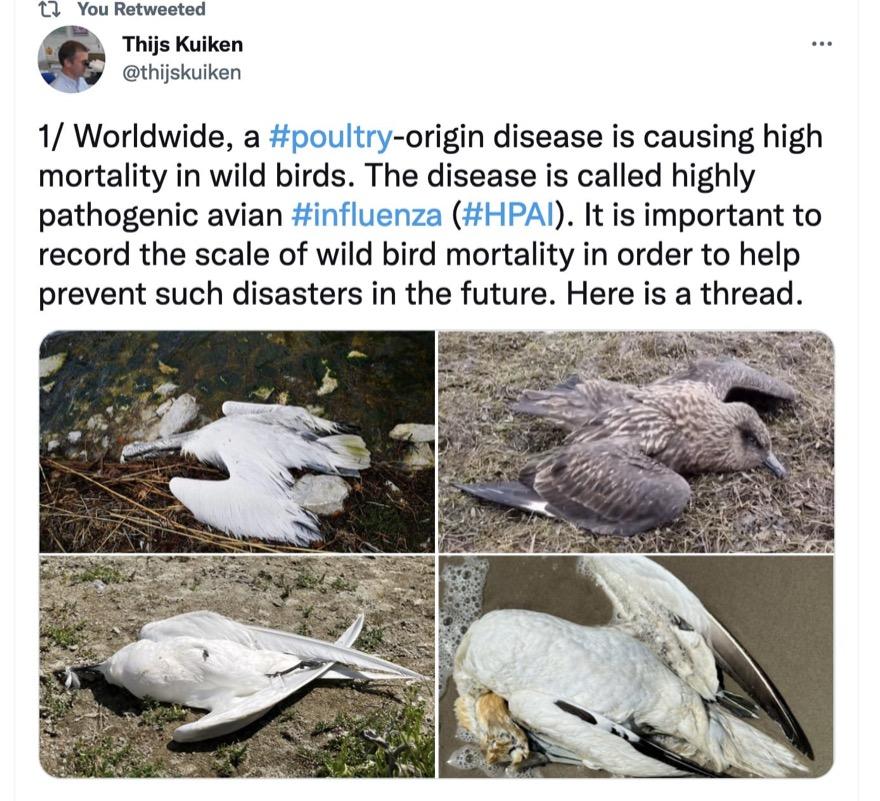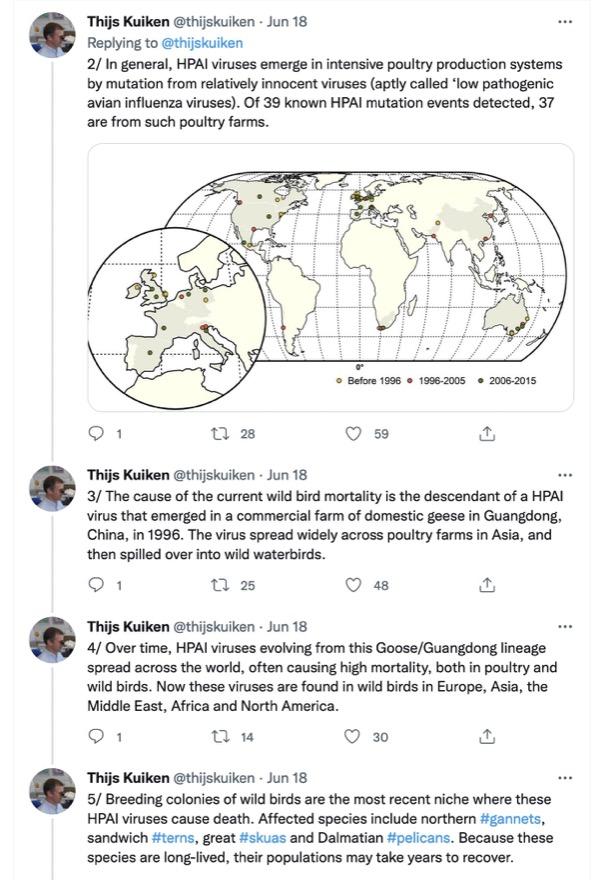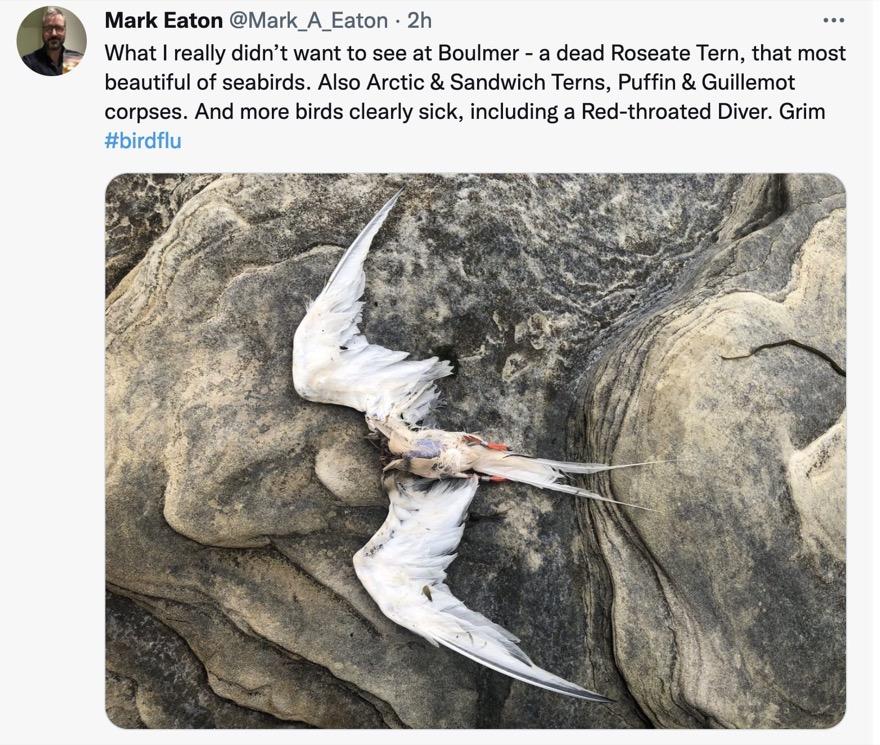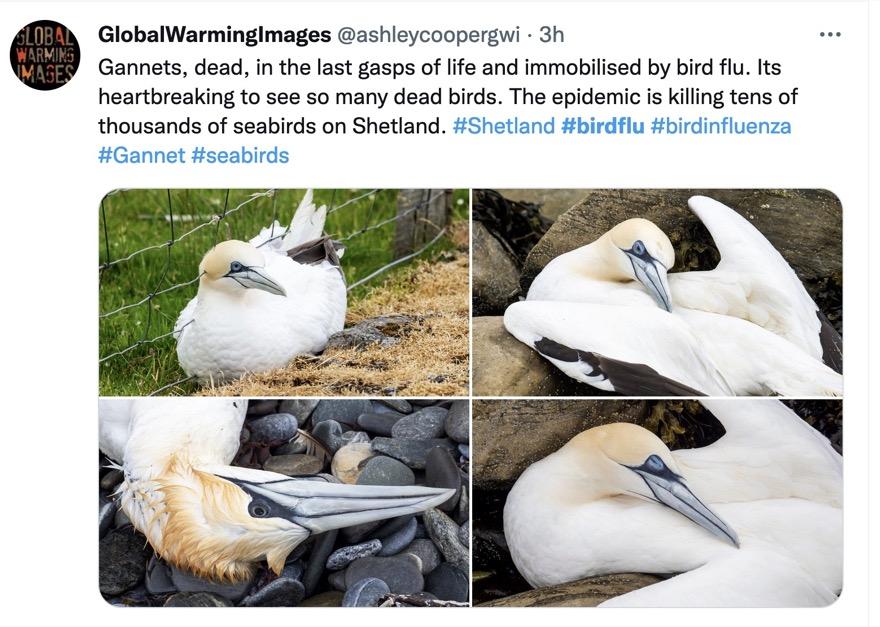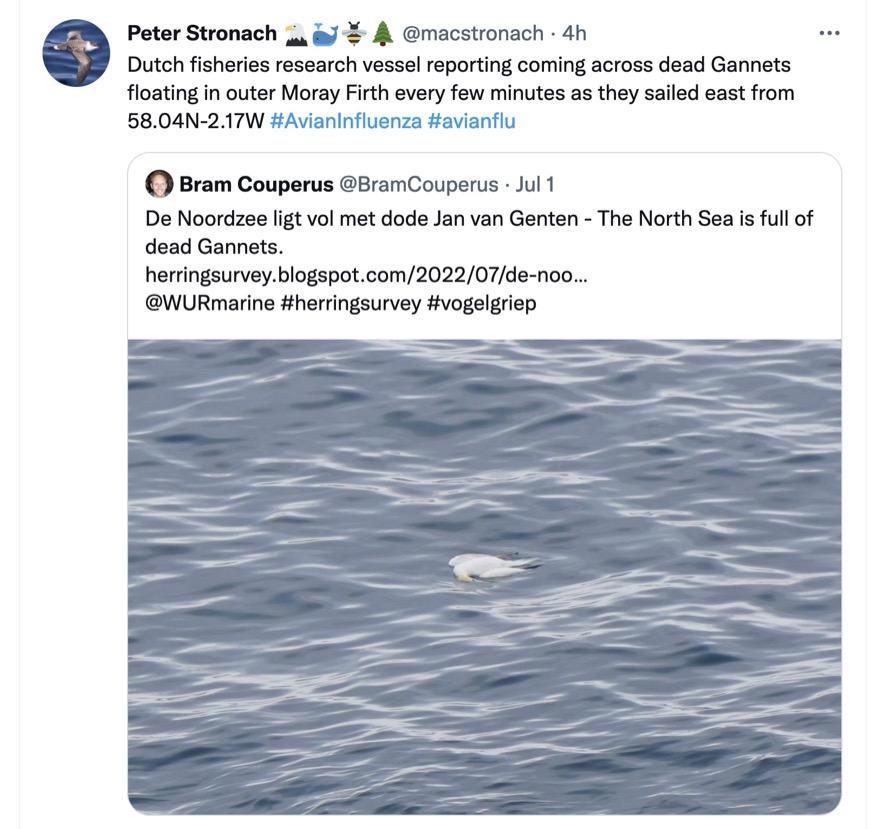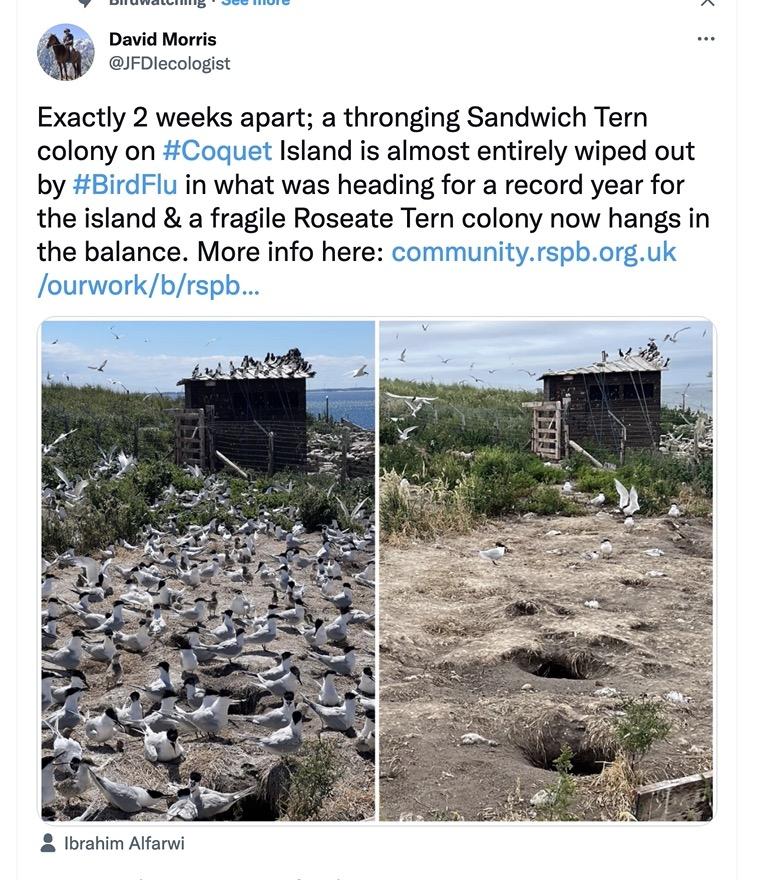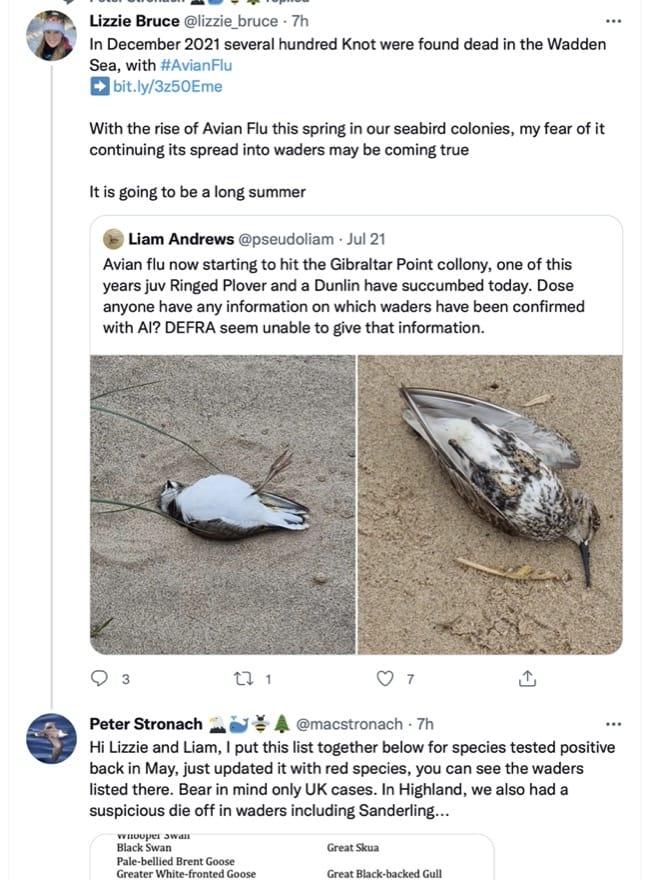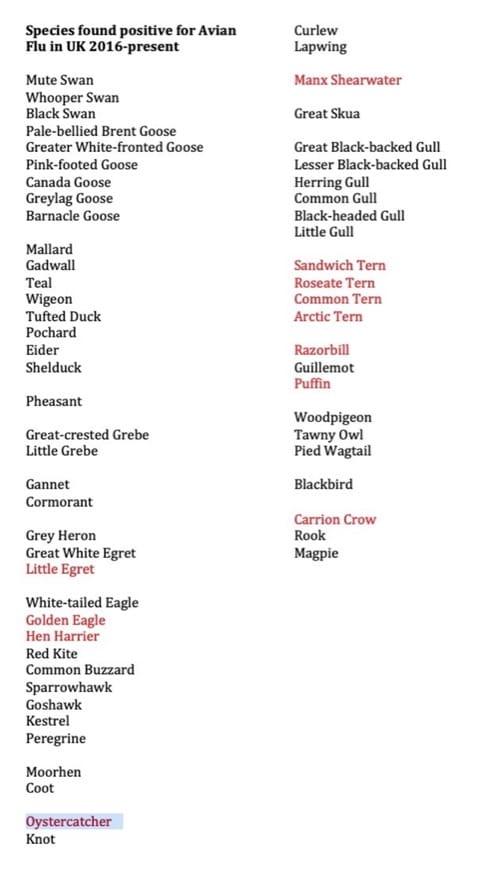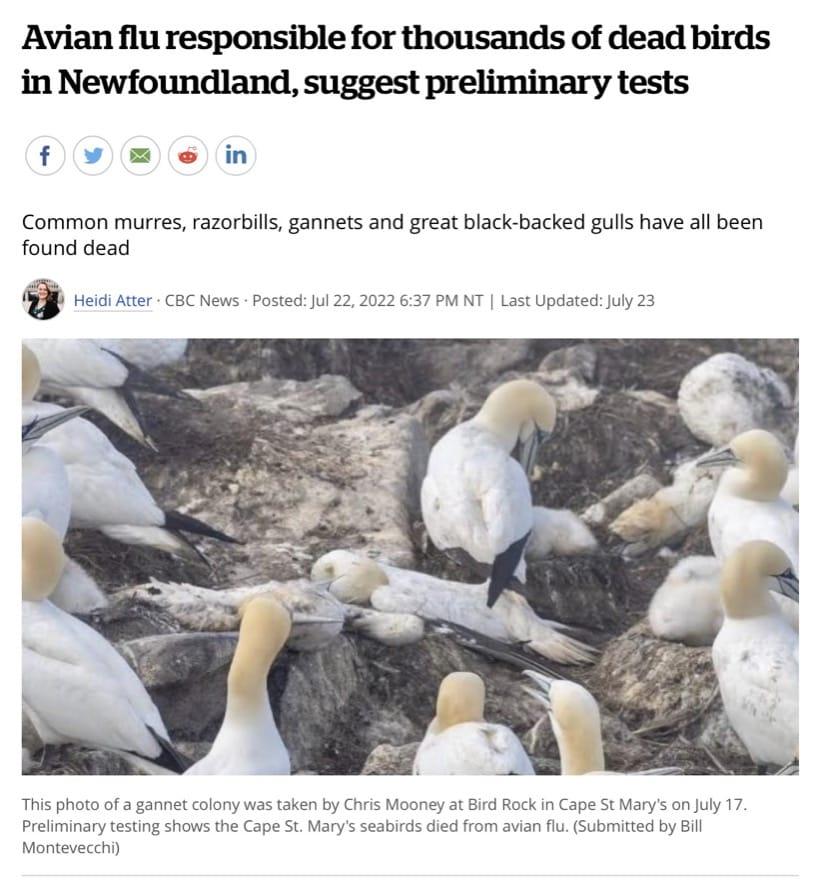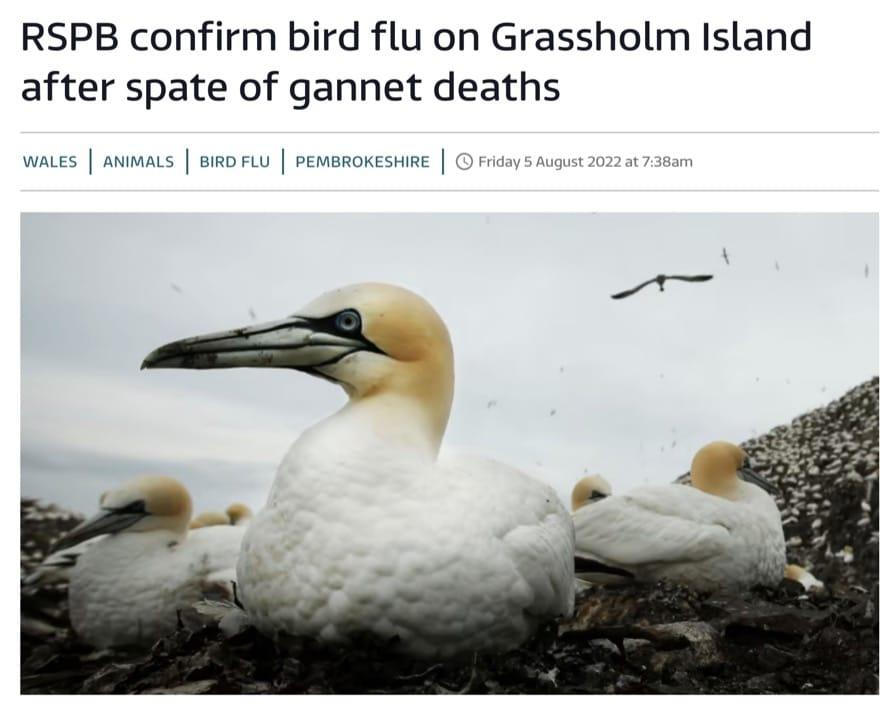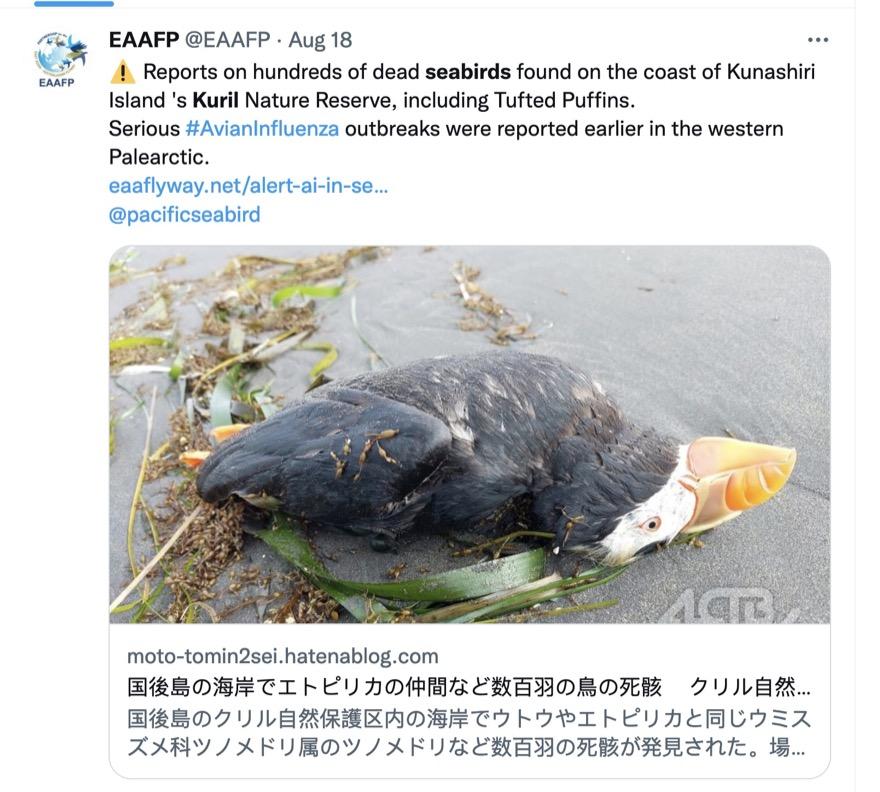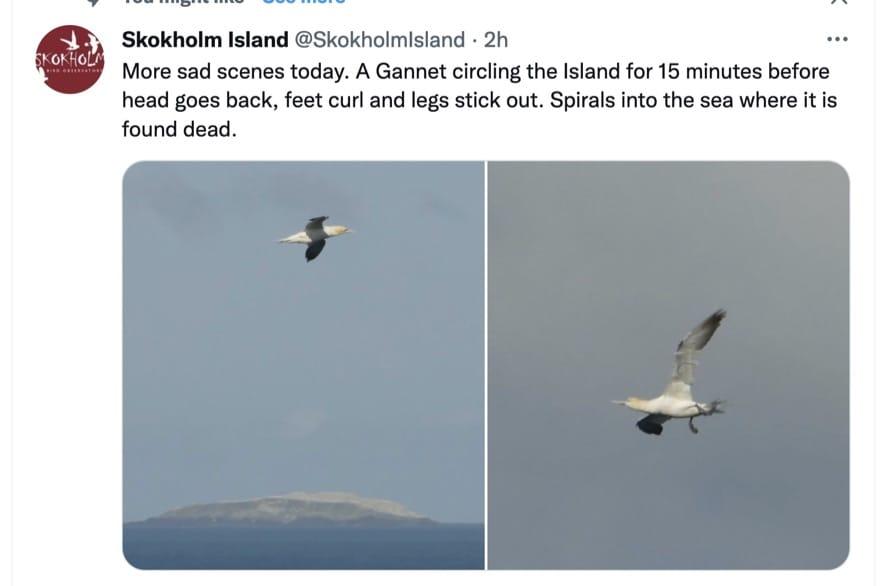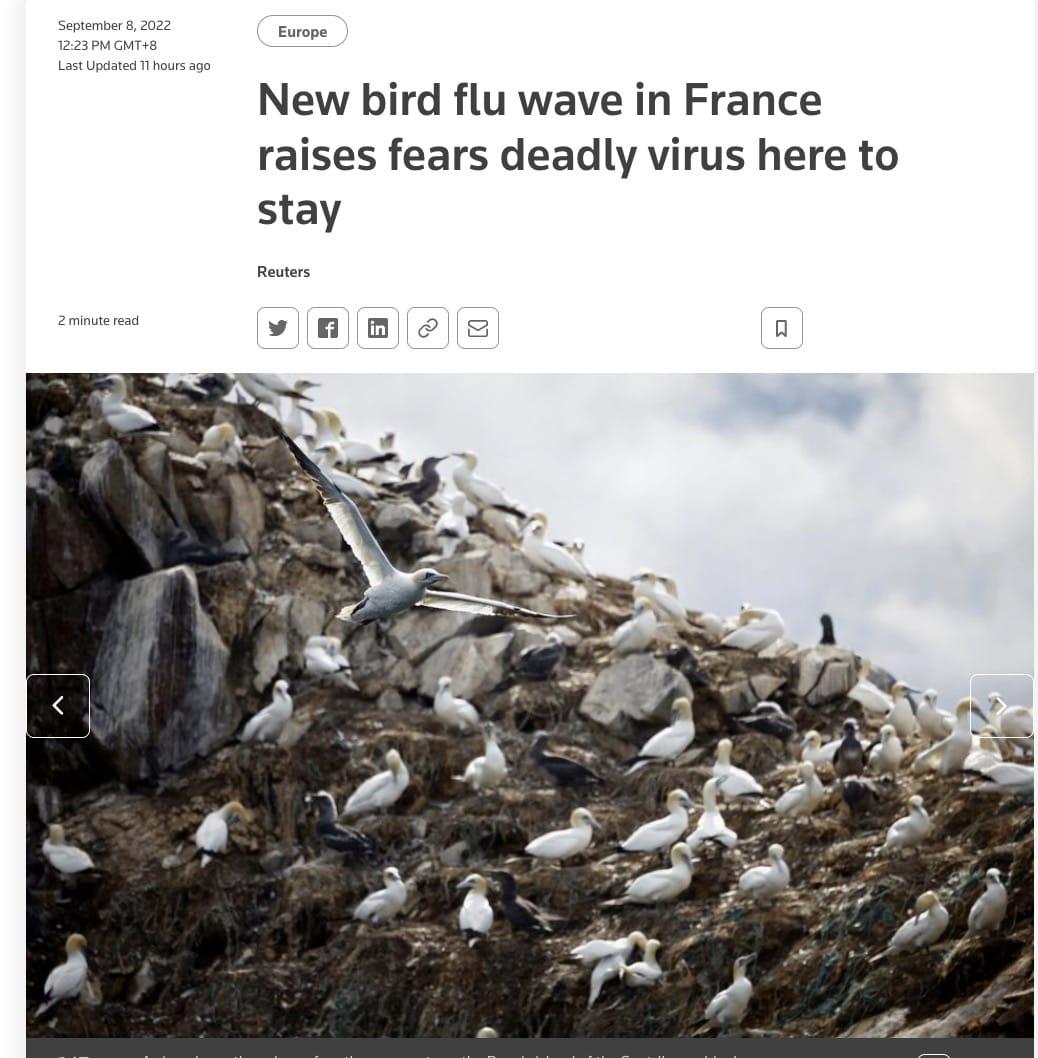Tagged: avian influenza, bird flu
- This topic has 20 replies, 1 voice, and was last updated 2 years, 4 months ago by
Martin Williams.
- AuthorPosts
- 30 June 2022 at 5:57 am #6573
Elsewhere in this forum, there’s a heap of info on migratory birds supposedly carrying highly pathogenic bird flu. In essence, seems they are merely scapegoats for the many issues with industrial poultry farming – in which highly pathogenic forms of bird flu evolve and are sustained; also transported, though the industry and its backers would rather it were otherwise, and seek to point blame at wild birds as vectors.
But unlike vaccinated poultry, which can be infected by highly pathogenic bird flu but not become very sick or die, highly pathogenic bird flu in wild birds tends to be a killer. And, as noted in forum, dead ducks don’t fly. So, outbreaks in wild birds tend to be, as it were, dead ends.
And for anyone really looking at cases where wild birds have been accused of being vectors, can turn out their migration routes and timing of migrations don’t fit the story. And might be transport within poultry industry, even if not immediately obvious: the trade in live poultry is huge, and includes smuggling.
BUT – in spring and summer 2022, there are reports of major die-offs at seabird colonies, some proven and others suspected to be caused by bird flu.
Clearly [yes, even to me], these result from transport by wild birds: the poultry industry is not delivering to rocky islands etc etc that host colonies.
It seems to me that highly pathogenic flu affecting seabird colonies may be of a kind that can be carried by some wild bird species that are not very prone to becoming sick and dying; while it can still kill a wide range of wild birds. Geese and ducks have long seemed like potential vectors – after all, known to carry regular forms of bird flu; but they too don’t head for many of seabird breeding sites [Bass Rock in Scotland, for instance]. Perhaps, then, gulls? – which do occur, are wide ranging, and not featuring prominently among the species killed.
Can hope research is being conducted that will help show what’s going on. Whether this can really help rectify the situation, I’m not sure. Right now, just seems like we are witnessing a disaster unfolding, and spreading; and can do little but report on it, while feeling mortified – especially given the high path flu was perhaps/ probably created [evolved] within the poultry industry.
Below, a few posts with reports on bird flu in wild birds, mainly on die offs during the 2022 breeding season.
While here’s a strong Twitter thread with background information, by Thijs Kuiken, Professor of Comparative Pathology at Erasmus University Rotterdam: https://twitter.com/thijskuiken/status/1537832228373385217 Couple of images with posts:

 30 June 2022 at 6:15 am #6574
30 June 2022 at 6:15 am #6574Bird flu has killed nearly 1,500 threatened Caspian terns on Lake Michigan islands
//Wildlife biologists are finding whole colonies of birds dead or dying on islands in Lake Michigan. They’s Caspian terns, which are listed as threatened in Michigan and endangered in Wisconsin.
…Sumner Matteson is an avian ecologist with the Wisconsin Department of Natural Resources. He said what he found on an island off of Wisconsin’s Door Peninsula was horrific.
“Seeing hundreds of dead birds scattered in a line before you with others dying among those. And it’s a — it’s a feeling of helplessness, knowing that there’s nothing, absolutely nothing, you can do for those birds.”
Sumner said he’s never seen anything so traumatic in his 42 years on the job.//
30 June 2022 at 6:21 am #6575A tweet re Boulmer in Northumberland, northeast England
.
 30 June 2022 at 6:24 am #6576
30 June 2022 at 6:24 am #6576Bird flu outbreak devastates UK seabird colonies
//Distressing images from the world’s largest colony of northern gannets have heralded the entry of a lethal strain of bird fluinto the UK’s seabirds.
Bass Rock appears partly deserted after the virus swept through the colony, while countless terns have washed ashore along the Norfolk coastline.
The new reports follow a number of bird flu outbreaks in Scotland at the start of the year, with the virus now spreading south into England. As of 28 June, 25 local authorities around the UK have reported cases in wild birds in the past two weeks, up from just three a month ago.
The outbreak of highly pathogenic avian influenza H5N1 (HPAI) is believed to have its origins in an epidemic which affected captive birds, such as chickens, earlier this year.//
30 June 2022 at 6:33 am #6579Plenty of images, disturbing info on Twitter, inc via hashtag #birdflu
 30 June 2022 at 6:59 am #6580
30 June 2022 at 6:59 am #6580I don’t like an article in New York Times (June 17, 2022), titled A Gull Flaps Its Wings and a Deadly Virus Explodes
Not even going to link to it.
Just tweeted re it:
//Some silliness in this.
Absurd re the gbb gull: so speculative. Geese more likely?
Anyone looked at trade? [any money in looking into the industry’s misdeeds?]
Cross Atlantic in 24hrs? Around 3000km Ireland to ne Canada direct. Woah!!!!
Vaccines exist.//
It was easy to find info on a bird flu vaccine, eg: New rapid protection bird flu vaccine
//- and had been warnings vaccines could lead to “silent” spread of bird flu in poultry: infected, but not real sick or dying.//
3 July 2022 at 6:17 pm #65853 July 2022 at 6:20 pm #6589Bird flu confirmed on Northumberland’s Coquet Island after hundreds of seabird deaths
//Hundreds of seabirds have died on the island, near Amble, in recent weeks with several special affected.
Samples sent to Defra have now tested positive for Highly Pathogenic Avian Influenza (HPAI).
Coquet Island, managed by the RSPB, is a wildlife sanctuary of international significance and home to an estimated 82,000 seabirds.//5 July 2022 at 5:55 am #6590 5 July 2022 at 11:18 am #6591
5 July 2022 at 11:18 am #6591 10 July 2022 at 1:54 pm #6619
10 July 2022 at 1:54 pm #6619Avian flu confirmed in dead birds found on Rathlin Island
Bird flu has been confirmed in a number of dead birds found on Rathlin Island, which is home to Northern Ireland’s largest seabird colony.
They were discovered at the island’s main harbour, Church Bay, earlier this week and removed for testing.
The RSPB says there are now suspected cases at the colony near its West Light Seabird Centre on the island.
Bird flu has also been confirmed at two other locations since the start of June.
There have been positive test results on birds found at Lough Erne, County Fermanagh, and in Bangor, County Down.
Gemma Daly, a veterinary officer with the Department of Agriculture, Environment and Rural Affairs (Daera), said there were 50 dead guillemots reported on Rathlin, which is where the positive test samples came from.12 July 2022 at 5:29 am #6630
Article referred to: Avian Influenza: the view from Coquet Island
19 July 2022 at 10:09 am #6679Bird flu cripples US Caspian Tern colonies
Avian influenza (HPAI) has wiped out thousands of Caspian Terns on Lake Michigan this summer, according to the Wisconsin Department of Natural Resources.
Routine monitoring of islands around the Door Peninsula in Wisconsin in early June produced a horrific shock for ornithologists, who found no fewer than 1,476 dead adult terns strewn across several colonies. The death toll for Gravel Island and Hat Island combined was 1,221.
22 July 2022 at 5:50 am #6770‘The scale is hard to grasp’: avian flu wreaks devastation on seabirds
//“Instead of the smell of guano, it’s the smell of death,” says Gwen Potter, a National Trust countryside manager working on the Farne Islands, off the coast of Northumberland. “It’s completely horrendous.”
This annual congregation of life has turned into a super-spreader event, as a highly pathogenic avian influenza, H5N1 – also known as bird flu – sweeps through populations of breeding birds, causing devastating losses. More than 300 outbreaks have been reported in UK seabird colonies, and dozens of coastal sites have closed to the public.
…
Early observations suggest that about 50% of birds infected with the virus die from it, but Prof Diana Bell, a conservation biologist at the University of East Anglia, who studied the H5N1 strain back in 2007, says the figure is more like 100%. “Anything that gets infected is not going to survive, unless the H5N1 has attenuated in its virulence during that time, but I don’t think so,” she says.
…
Bell says she has never heard of an asymptomatic bird with the virus and therefore doesn’t think wild birds would be able to spread it over long distances. She believes the international poultry trade is the main driver of the virus and says stopping imports of chicks and birds for the trade would be an important step in reducing the risk of future outbreaks. “Originally, it was poultry to wild birds; it was not wild birds which were spreading it. It was frustrating to see wild birds being blamed … We’ve got to get out of our heads that the wild birds are the bad guys here,” she says.//23 July 2022 at 11:56 am #679124 July 2022 at 8:42 am #680729 July 2022 at 6:53 am #6939//“It is justified to talk about a disaster,” Anders Wirdheim, chairman of the city of Halmstad’s ornithological association, told local broadcaster SVT, after hundreds of dead northern gannets had been discovered in a short amount of time. Most of them were infected.
“If [the outbreak] continues, and it seems like it will, then the situation is serious,” Wirdheim said, adding “if 7,000 birds disappear in a colony, it is fair to call it a catastrophe. That is the scenario we see right now, with a risk of this becoming a recurring event.”
…Birds infected with the flu virus display unnatural behavior before they die. Observers have witnessed terminally ill swans circling around themselves and geese flying irrationally up and down.
The bird flu reaches the brain and causes severe inflammation. When it hits the central nervous system, it causes the bird to lose control of its body.//
Bird flu outbreak leaves Swedish coast littered with carcasses
6 August 2022 at 10:27 am #706321 August 2022 at 11:17 am #7603From Twitter; on island north of Japan [Russian territory]
 27 August 2022 at 9:48 pm #7672
27 August 2022 at 9:48 pm #7672Just seen on twitter; awful
 8 September 2022 at 11:14 pm #8469
8 September 2022 at 11:14 pm #8469
Thousands of seabirds have perished along France’s western shores in past weeks because of the viral infection, which usually strikes during autumn and winter months, raising fears it may have become a year-round risk and endemic to French wildlife.
New bird flu wave in France raises fears deadly virus here to stay
- AuthorPosts
- You must be logged in to reply to this topic.

